WS4503 Social Work and Mental Health: Blog Post Analysis
VerifiedAdded on 2023/01/03
|7
|1925
|38
Homework Assignment
AI Summary
This assignment comprises three blog posts written by a social work student. The first post challenges the traditional definition of health, advocating for a holistic view encompassing physical, mental, and social well-being. It discusses the stigma associated with mental illness, government's role, and the need for social workers to address inequality. The second blog post focuses on the mental health of Aboriginal and Torres Strait Islander populations, highlighting cultural considerations, the Queensland Plan for Mental Health, and the unique challenges faced by social workers in providing care. The final post examines the growing severity of mental illness issues, societal reluctance to seek help due to stigma, and the importance of ethical and culturally inclusive social work practices. The student emphasizes the need for social workers to understand individual needs and the rights of mental health patients, advocating for practical application of policies and plans to improve patient outcomes. The assignment reflects on the complexities of mental health care within diverse communities, highlighting the importance of empathy, cultural sensitivity, and ethical practice in social work.
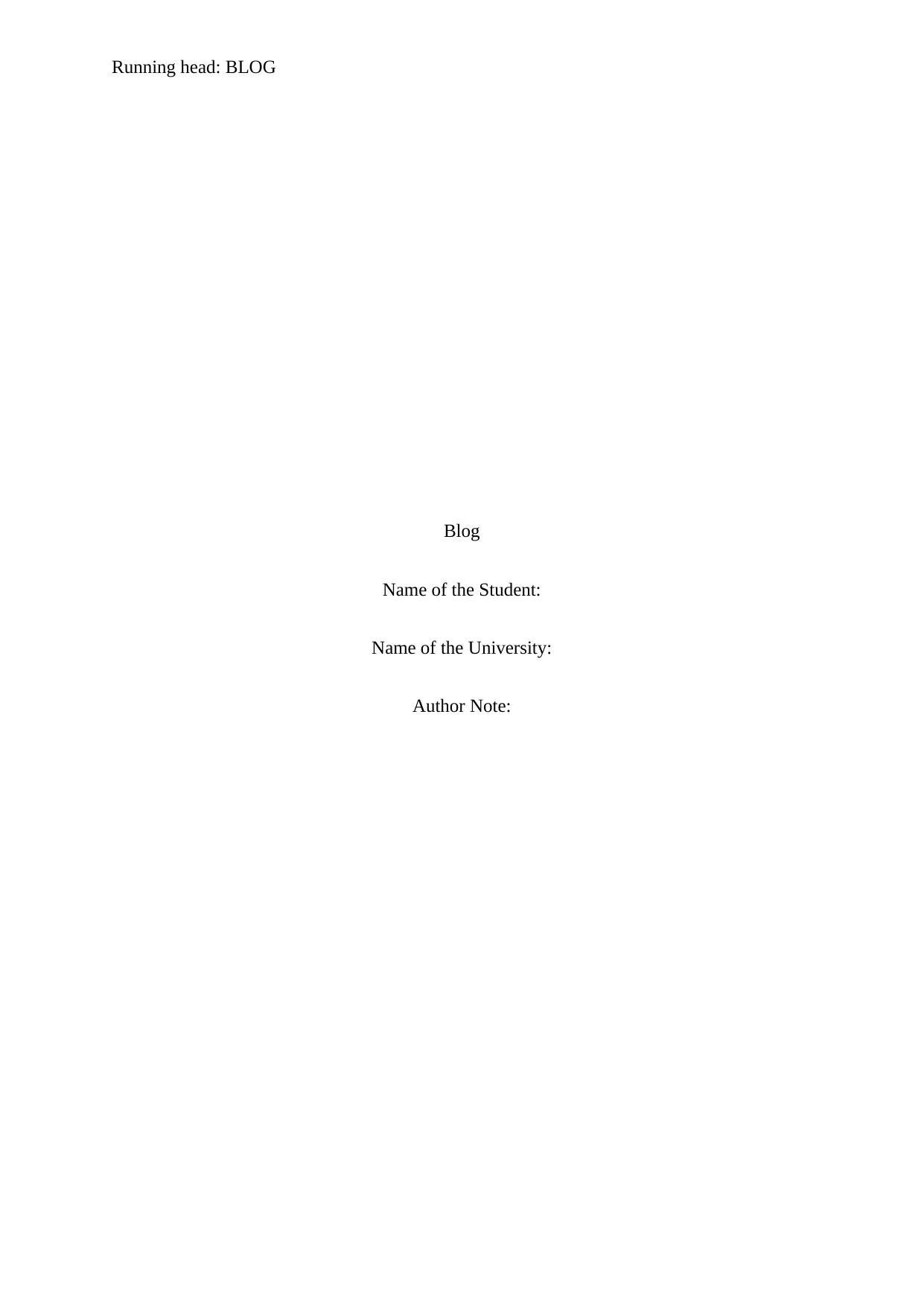
Running head: BLOG
Blog
Name of the Student:
Name of the University:
Author Note:
Blog
Name of the Student:
Name of the University:
Author Note:
Paraphrase This Document
Need a fresh take? Get an instant paraphrase of this document with our AI Paraphraser
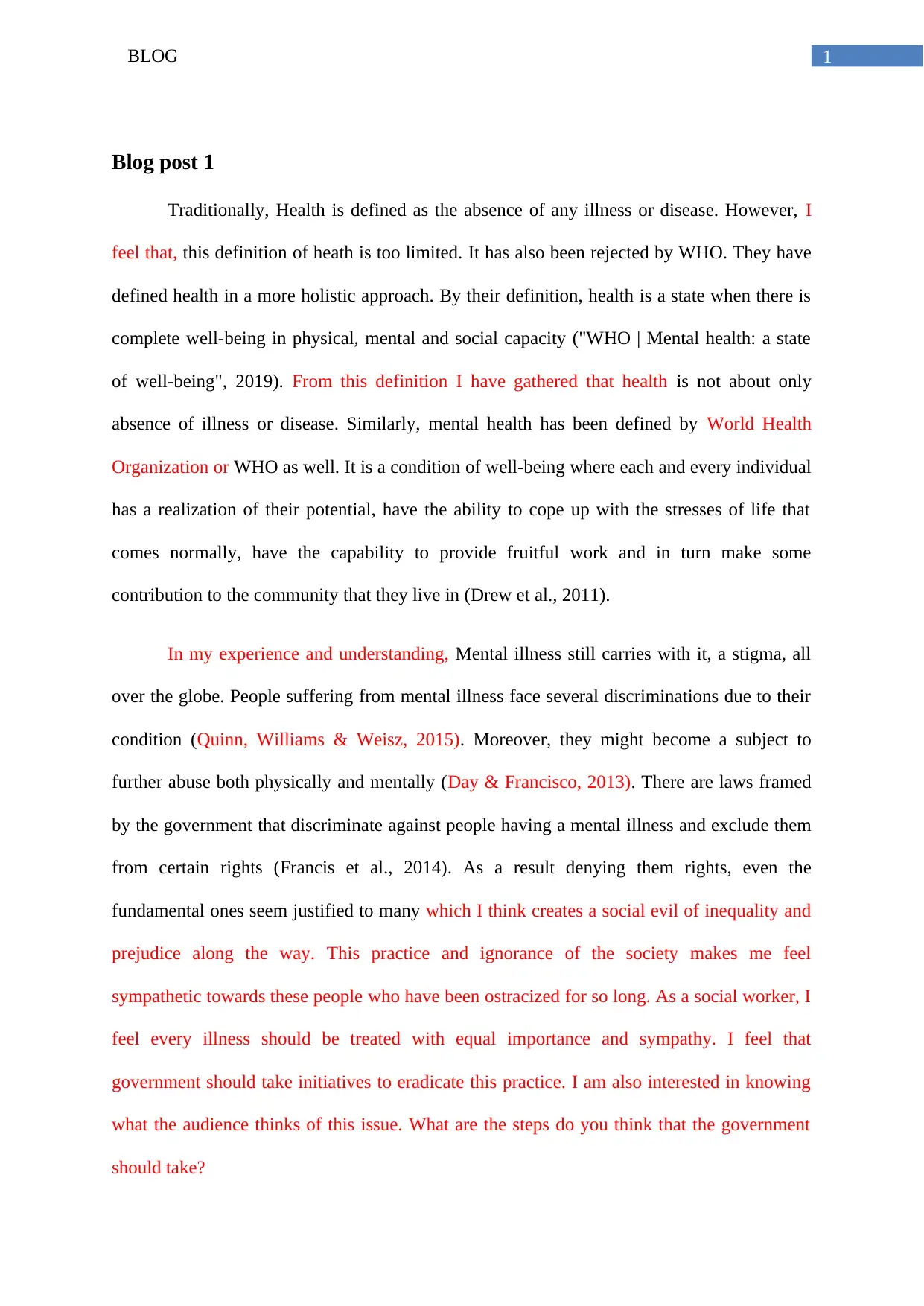
1BLOG
Blog post 1
Traditionally, Health is defined as the absence of any illness or disease. However, I
feel that, this definition of heath is too limited. It has also been rejected by WHO. They have
defined health in a more holistic approach. By their definition, health is a state when there is
complete well-being in physical, mental and social capacity ("WHO | Mental health: a state
of well-being", 2019). From this definition I have gathered that health is not about only
absence of illness or disease. Similarly, mental health has been defined by World Health
Organization or WHO as well. It is a condition of well-being where each and every individual
has a realization of their potential, have the ability to cope up with the stresses of life that
comes normally, have the capability to provide fruitful work and in turn make some
contribution to the community that they live in (Drew et al., 2011).
In my experience and understanding, Mental illness still carries with it, a stigma, all
over the globe. People suffering from mental illness face several discriminations due to their
condition (Quinn, Williams & Weisz, 2015). Moreover, they might become a subject to
further abuse both physically and mentally (Day & Francisco, 2013). There are laws framed
by the government that discriminate against people having a mental illness and exclude them
from certain rights (Francis et al., 2014). As a result denying them rights, even the
fundamental ones seem justified to many which I think creates a social evil of inequality and
prejudice along the way. This practice and ignorance of the society makes me feel
sympathetic towards these people who have been ostracized for so long. As a social worker, I
feel every illness should be treated with equal importance and sympathy. I feel that
government should take initiatives to eradicate this practice. I am also interested in knowing
what the audience thinks of this issue. What are the steps do you think that the government
should take?
Blog post 1
Traditionally, Health is defined as the absence of any illness or disease. However, I
feel that, this definition of heath is too limited. It has also been rejected by WHO. They have
defined health in a more holistic approach. By their definition, health is a state when there is
complete well-being in physical, mental and social capacity ("WHO | Mental health: a state
of well-being", 2019). From this definition I have gathered that health is not about only
absence of illness or disease. Similarly, mental health has been defined by World Health
Organization or WHO as well. It is a condition of well-being where each and every individual
has a realization of their potential, have the ability to cope up with the stresses of life that
comes normally, have the capability to provide fruitful work and in turn make some
contribution to the community that they live in (Drew et al., 2011).
In my experience and understanding, Mental illness still carries with it, a stigma, all
over the globe. People suffering from mental illness face several discriminations due to their
condition (Quinn, Williams & Weisz, 2015). Moreover, they might become a subject to
further abuse both physically and mentally (Day & Francisco, 2013). There are laws framed
by the government that discriminate against people having a mental illness and exclude them
from certain rights (Francis et al., 2014). As a result denying them rights, even the
fundamental ones seem justified to many which I think creates a social evil of inequality and
prejudice along the way. This practice and ignorance of the society makes me feel
sympathetic towards these people who have been ostracized for so long. As a social worker, I
feel every illness should be treated with equal importance and sympathy. I feel that
government should take initiatives to eradicate this practice. I am also interested in knowing
what the audience thinks of this issue. What are the steps do you think that the government
should take?
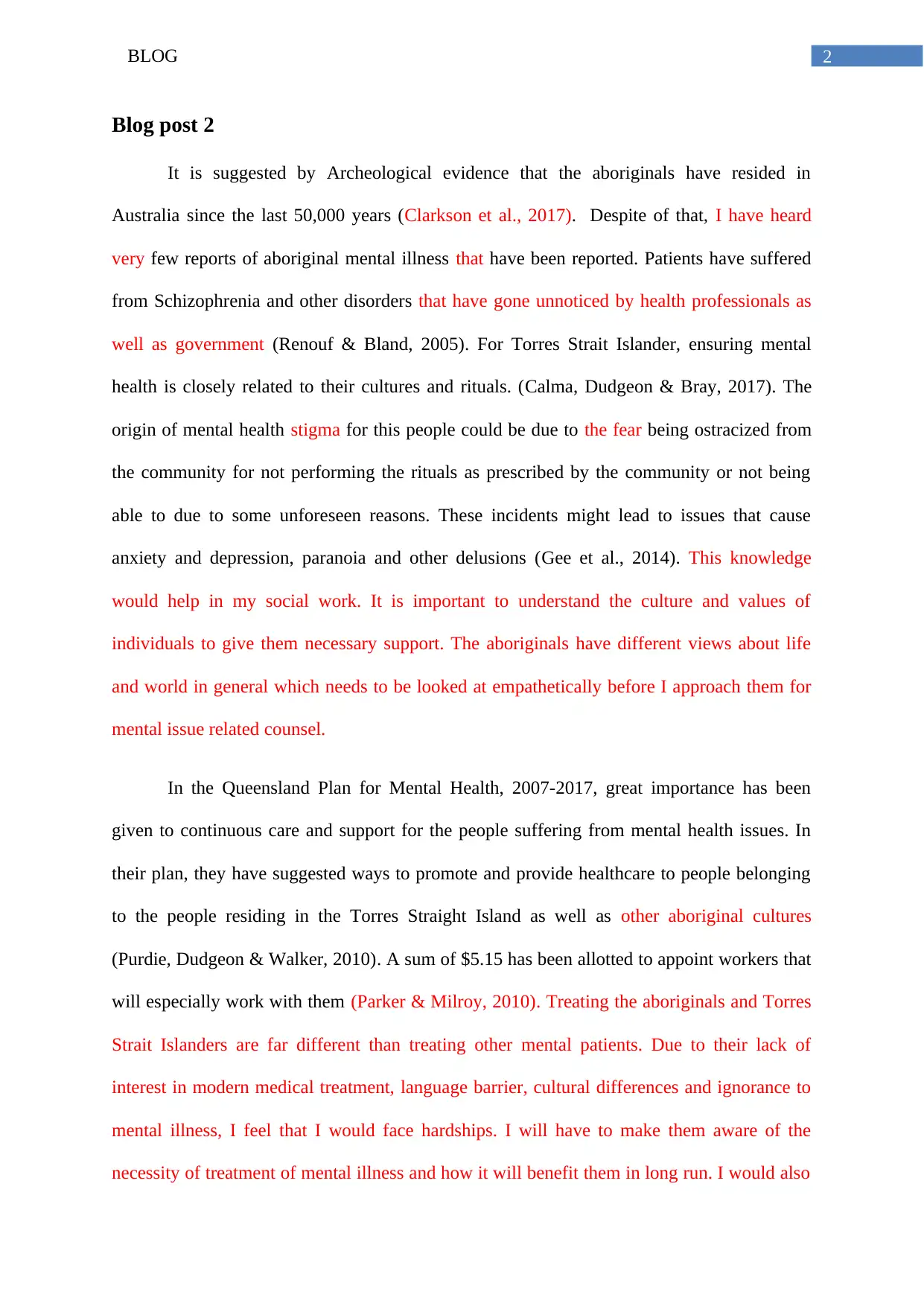
2BLOG
Blog post 2
It is suggested by Archeological evidence that the aboriginals have resided in
Australia since the last 50,000 years (Clarkson et al., 2017). Despite of that, I have heard
very few reports of aboriginal mental illness that have been reported. Patients have suffered
from Schizophrenia and other disorders that have gone unnoticed by health professionals as
well as government (Renouf & Bland, 2005). For Torres Strait Islander, ensuring mental
health is closely related to their cultures and rituals. (Calma, Dudgeon & Bray, 2017). The
origin of mental health stigma for this people could be due to the fear being ostracized from
the community for not performing the rituals as prescribed by the community or not being
able to due to some unforeseen reasons. These incidents might lead to issues that cause
anxiety and depression, paranoia and other delusions (Gee et al., 2014). This knowledge
would help in my social work. It is important to understand the culture and values of
individuals to give them necessary support. The aboriginals have different views about life
and world in general which needs to be looked at empathetically before I approach them for
mental issue related counsel.
In the Queensland Plan for Mental Health, 2007-2017, great importance has been
given to continuous care and support for the people suffering from mental health issues. In
their plan, they have suggested ways to promote and provide healthcare to people belonging
to the people residing in the Torres Straight Island as well as other aboriginal cultures
(Purdie, Dudgeon & Walker, 2010). A sum of $5.15 has been allotted to appoint workers that
will especially work with them (Parker & Milroy, 2010). Treating the aboriginals and Torres
Strait Islanders are far different than treating other mental patients. Due to their lack of
interest in modern medical treatment, language barrier, cultural differences and ignorance to
mental illness, I feel that I would face hardships. I will have to make them aware of the
necessity of treatment of mental illness and how it will benefit them in long run. I would also
Blog post 2
It is suggested by Archeological evidence that the aboriginals have resided in
Australia since the last 50,000 years (Clarkson et al., 2017). Despite of that, I have heard
very few reports of aboriginal mental illness that have been reported. Patients have suffered
from Schizophrenia and other disorders that have gone unnoticed by health professionals as
well as government (Renouf & Bland, 2005). For Torres Strait Islander, ensuring mental
health is closely related to their cultures and rituals. (Calma, Dudgeon & Bray, 2017). The
origin of mental health stigma for this people could be due to the fear being ostracized from
the community for not performing the rituals as prescribed by the community or not being
able to due to some unforeseen reasons. These incidents might lead to issues that cause
anxiety and depression, paranoia and other delusions (Gee et al., 2014). This knowledge
would help in my social work. It is important to understand the culture and values of
individuals to give them necessary support. The aboriginals have different views about life
and world in general which needs to be looked at empathetically before I approach them for
mental issue related counsel.
In the Queensland Plan for Mental Health, 2007-2017, great importance has been
given to continuous care and support for the people suffering from mental health issues. In
their plan, they have suggested ways to promote and provide healthcare to people belonging
to the people residing in the Torres Straight Island as well as other aboriginal cultures
(Purdie, Dudgeon & Walker, 2010). A sum of $5.15 has been allotted to appoint workers that
will especially work with them (Parker & Milroy, 2010). Treating the aboriginals and Torres
Strait Islanders are far different than treating other mental patients. Due to their lack of
interest in modern medical treatment, language barrier, cultural differences and ignorance to
mental illness, I feel that I would face hardships. I will have to make them aware of the
necessity of treatment of mental illness and how it will benefit them in long run. I would also
⊘ This is a preview!⊘
Do you want full access?
Subscribe today to unlock all pages.

Trusted by 1+ million students worldwide
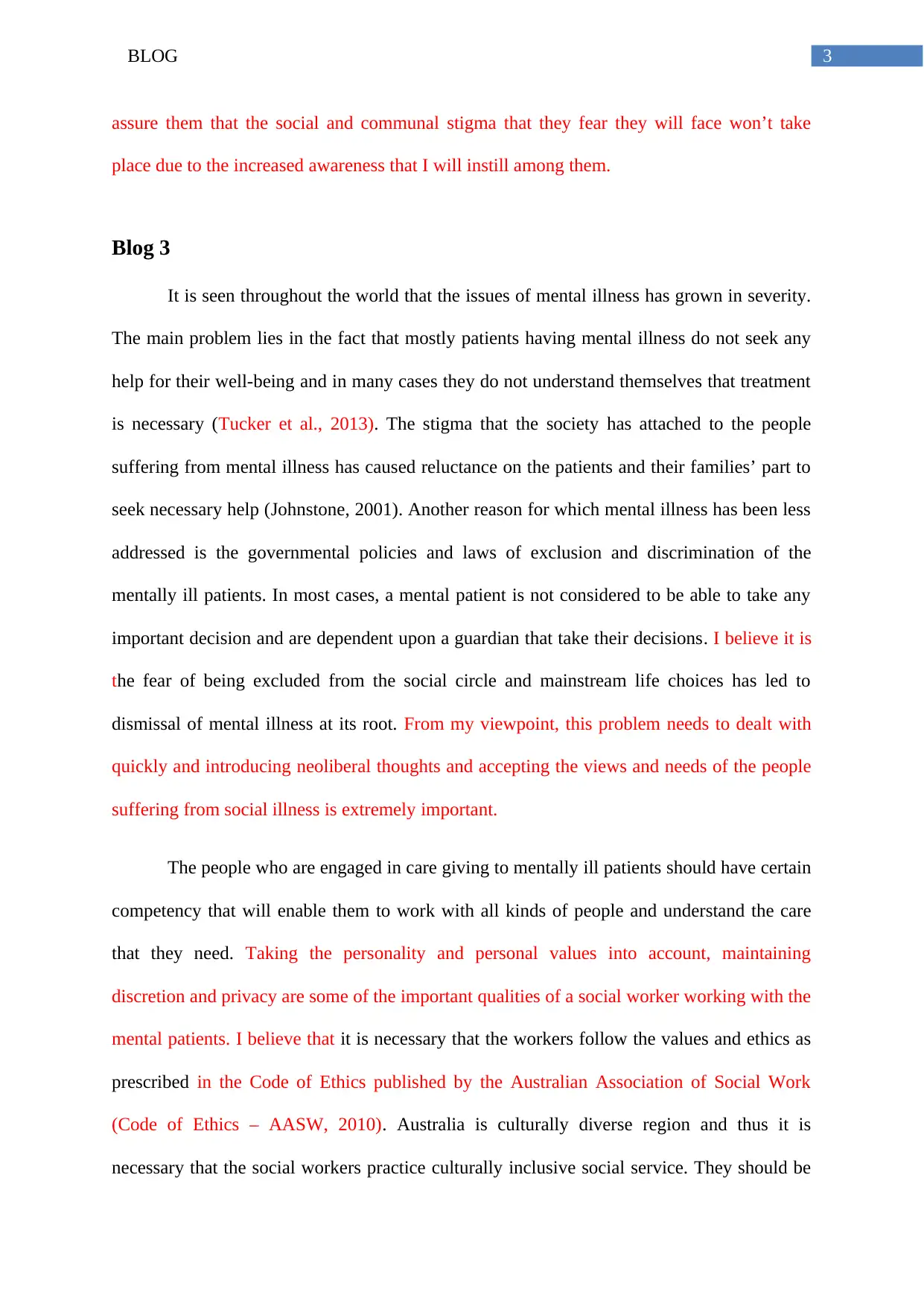
3BLOG
assure them that the social and communal stigma that they fear they will face won’t take
place due to the increased awareness that I will instill among them.
Blog 3
It is seen throughout the world that the issues of mental illness has grown in severity.
The main problem lies in the fact that mostly patients having mental illness do not seek any
help for their well-being and in many cases they do not understand themselves that treatment
is necessary (Tucker et al., 2013). The stigma that the society has attached to the people
suffering from mental illness has caused reluctance on the patients and their families’ part to
seek necessary help (Johnstone, 2001). Another reason for which mental illness has been less
addressed is the governmental policies and laws of exclusion and discrimination of the
mentally ill patients. In most cases, a mental patient is not considered to be able to take any
important decision and are dependent upon a guardian that take their decisions. I believe it is
the fear of being excluded from the social circle and mainstream life choices has led to
dismissal of mental illness at its root. From my viewpoint, this problem needs to dealt with
quickly and introducing neoliberal thoughts and accepting the views and needs of the people
suffering from social illness is extremely important.
The people who are engaged in care giving to mentally ill patients should have certain
competency that will enable them to work with all kinds of people and understand the care
that they need. Taking the personality and personal values into account, maintaining
discretion and privacy are some of the important qualities of a social worker working with the
mental patients. I believe that it is necessary that the workers follow the values and ethics as
prescribed in the Code of Ethics published by the Australian Association of Social Work
(Code of Ethics – AASW, 2010). Australia is culturally diverse region and thus it is
necessary that the social workers practice culturally inclusive social service. They should be
assure them that the social and communal stigma that they fear they will face won’t take
place due to the increased awareness that I will instill among them.
Blog 3
It is seen throughout the world that the issues of mental illness has grown in severity.
The main problem lies in the fact that mostly patients having mental illness do not seek any
help for their well-being and in many cases they do not understand themselves that treatment
is necessary (Tucker et al., 2013). The stigma that the society has attached to the people
suffering from mental illness has caused reluctance on the patients and their families’ part to
seek necessary help (Johnstone, 2001). Another reason for which mental illness has been less
addressed is the governmental policies and laws of exclusion and discrimination of the
mentally ill patients. In most cases, a mental patient is not considered to be able to take any
important decision and are dependent upon a guardian that take their decisions. I believe it is
the fear of being excluded from the social circle and mainstream life choices has led to
dismissal of mental illness at its root. From my viewpoint, this problem needs to dealt with
quickly and introducing neoliberal thoughts and accepting the views and needs of the people
suffering from social illness is extremely important.
The people who are engaged in care giving to mentally ill patients should have certain
competency that will enable them to work with all kinds of people and understand the care
that they need. Taking the personality and personal values into account, maintaining
discretion and privacy are some of the important qualities of a social worker working with the
mental patients. I believe that it is necessary that the workers follow the values and ethics as
prescribed in the Code of Ethics published by the Australian Association of Social Work
(Code of Ethics – AASW, 2010). Australia is culturally diverse region and thus it is
necessary that the social workers practice culturally inclusive social service. They should be
Paraphrase This Document
Need a fresh take? Get an instant paraphrase of this document with our AI Paraphraser
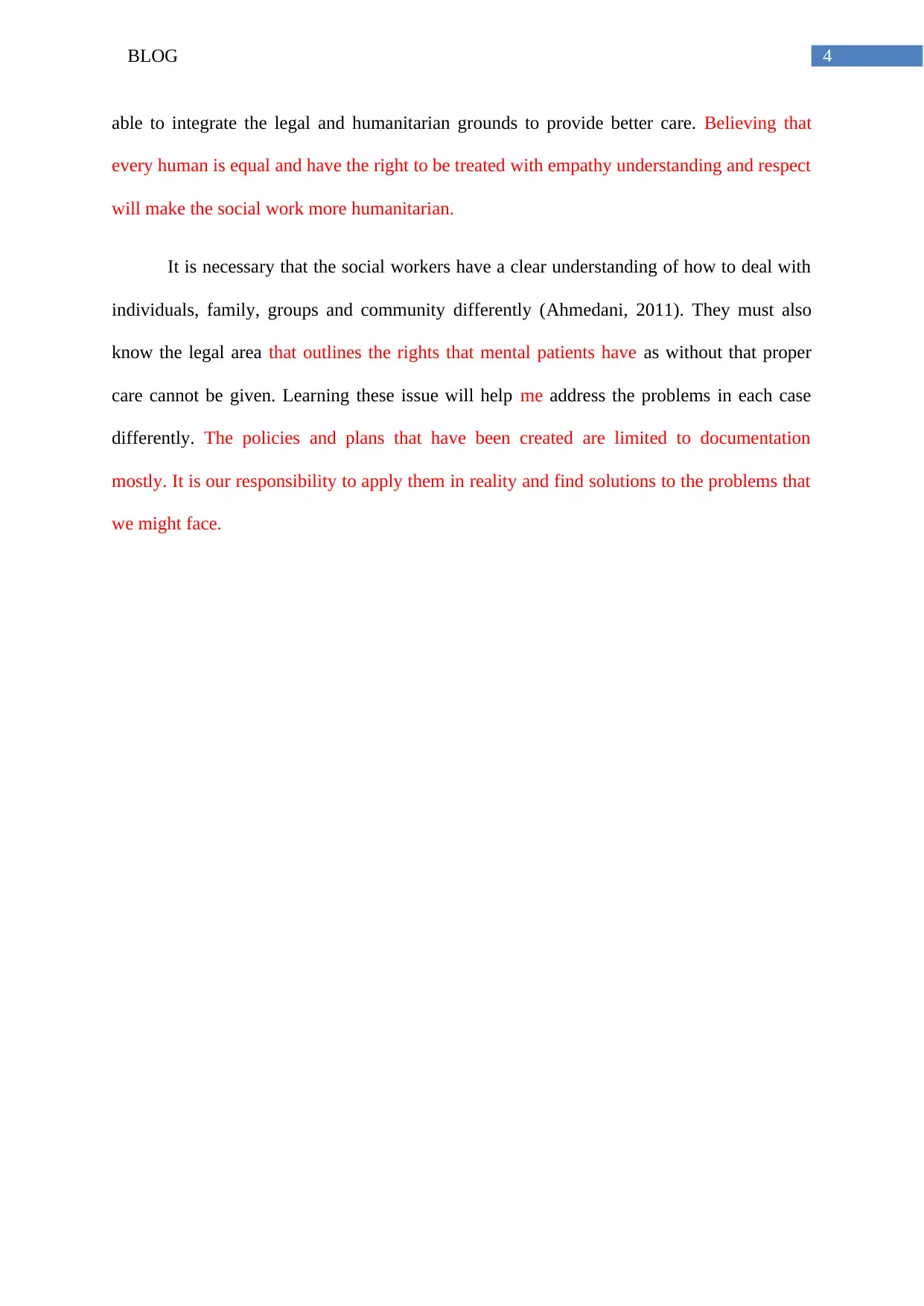
4BLOG
able to integrate the legal and humanitarian grounds to provide better care. Believing that
every human is equal and have the right to be treated with empathy understanding and respect
will make the social work more humanitarian.
It is necessary that the social workers have a clear understanding of how to deal with
individuals, family, groups and community differently (Ahmedani, 2011). They must also
know the legal area that outlines the rights that mental patients have as without that proper
care cannot be given. Learning these issue will help me address the problems in each case
differently. The policies and plans that have been created are limited to documentation
mostly. It is our responsibility to apply them in reality and find solutions to the problems that
we might face.
able to integrate the legal and humanitarian grounds to provide better care. Believing that
every human is equal and have the right to be treated with empathy understanding and respect
will make the social work more humanitarian.
It is necessary that the social workers have a clear understanding of how to deal with
individuals, family, groups and community differently (Ahmedani, 2011). They must also
know the legal area that outlines the rights that mental patients have as without that proper
care cannot be given. Learning these issue will help me address the problems in each case
differently. The policies and plans that have been created are limited to documentation
mostly. It is our responsibility to apply them in reality and find solutions to the problems that
we might face.
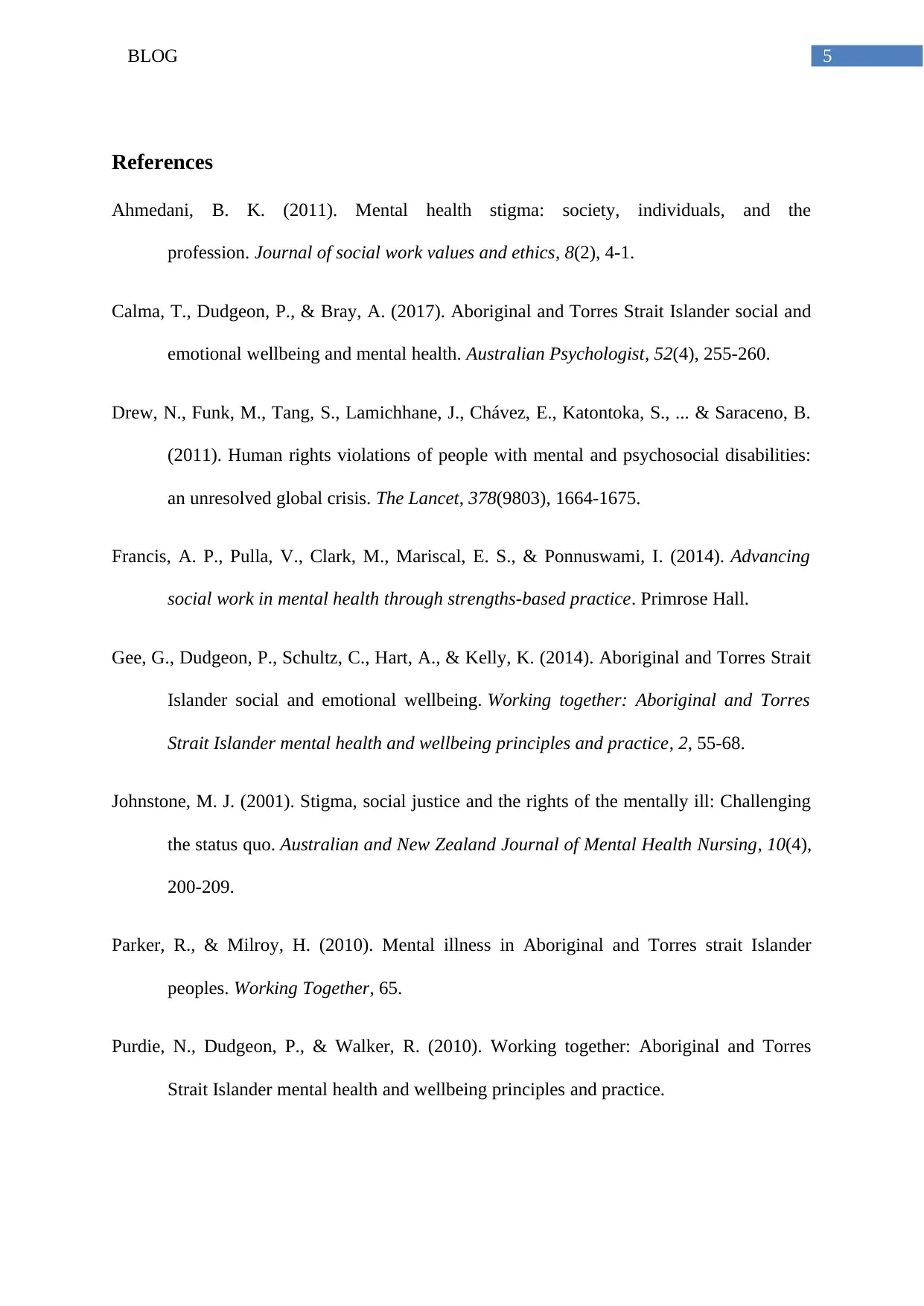
5BLOG
References
Ahmedani, B. K. (2011). Mental health stigma: society, individuals, and the
profession. Journal of social work values and ethics, 8(2), 4-1.
Calma, T., Dudgeon, P., & Bray, A. (2017). Aboriginal and Torres Strait Islander social and
emotional wellbeing and mental health. Australian Psychologist, 52(4), 255-260.
Drew, N., Funk, M., Tang, S., Lamichhane, J., Chávez, E., Katontoka, S., ... & Saraceno, B.
(2011). Human rights violations of people with mental and psychosocial disabilities:
an unresolved global crisis. The Lancet, 378(9803), 1664-1675.
Francis, A. P., Pulla, V., Clark, M., Mariscal, E. S., & Ponnuswami, I. (2014). Advancing
social work in mental health through strengths-based practice. Primrose Hall.
Gee, G., Dudgeon, P., Schultz, C., Hart, A., & Kelly, K. (2014). Aboriginal and Torres Strait
Islander social and emotional wellbeing. Working together: Aboriginal and Torres
Strait Islander mental health and wellbeing principles and practice, 2, 55-68.
Johnstone, M. J. (2001). Stigma, social justice and the rights of the mentally ill: Challenging
the status quo. Australian and New Zealand Journal of Mental Health Nursing, 10(4),
200-209.
Parker, R., & Milroy, H. (2010). Mental illness in Aboriginal and Torres strait Islander
peoples. Working Together, 65.
Purdie, N., Dudgeon, P., & Walker, R. (2010). Working together: Aboriginal and Torres
Strait Islander mental health and wellbeing principles and practice.
References
Ahmedani, B. K. (2011). Mental health stigma: society, individuals, and the
profession. Journal of social work values and ethics, 8(2), 4-1.
Calma, T., Dudgeon, P., & Bray, A. (2017). Aboriginal and Torres Strait Islander social and
emotional wellbeing and mental health. Australian Psychologist, 52(4), 255-260.
Drew, N., Funk, M., Tang, S., Lamichhane, J., Chávez, E., Katontoka, S., ... & Saraceno, B.
(2011). Human rights violations of people with mental and psychosocial disabilities:
an unresolved global crisis. The Lancet, 378(9803), 1664-1675.
Francis, A. P., Pulla, V., Clark, M., Mariscal, E. S., & Ponnuswami, I. (2014). Advancing
social work in mental health through strengths-based practice. Primrose Hall.
Gee, G., Dudgeon, P., Schultz, C., Hart, A., & Kelly, K. (2014). Aboriginal and Torres Strait
Islander social and emotional wellbeing. Working together: Aboriginal and Torres
Strait Islander mental health and wellbeing principles and practice, 2, 55-68.
Johnstone, M. J. (2001). Stigma, social justice and the rights of the mentally ill: Challenging
the status quo. Australian and New Zealand Journal of Mental Health Nursing, 10(4),
200-209.
Parker, R., & Milroy, H. (2010). Mental illness in Aboriginal and Torres strait Islander
peoples. Working Together, 65.
Purdie, N., Dudgeon, P., & Walker, R. (2010). Working together: Aboriginal and Torres
Strait Islander mental health and wellbeing principles and practice.
⊘ This is a preview!⊘
Do you want full access?
Subscribe today to unlock all pages.

Trusted by 1+ million students worldwide
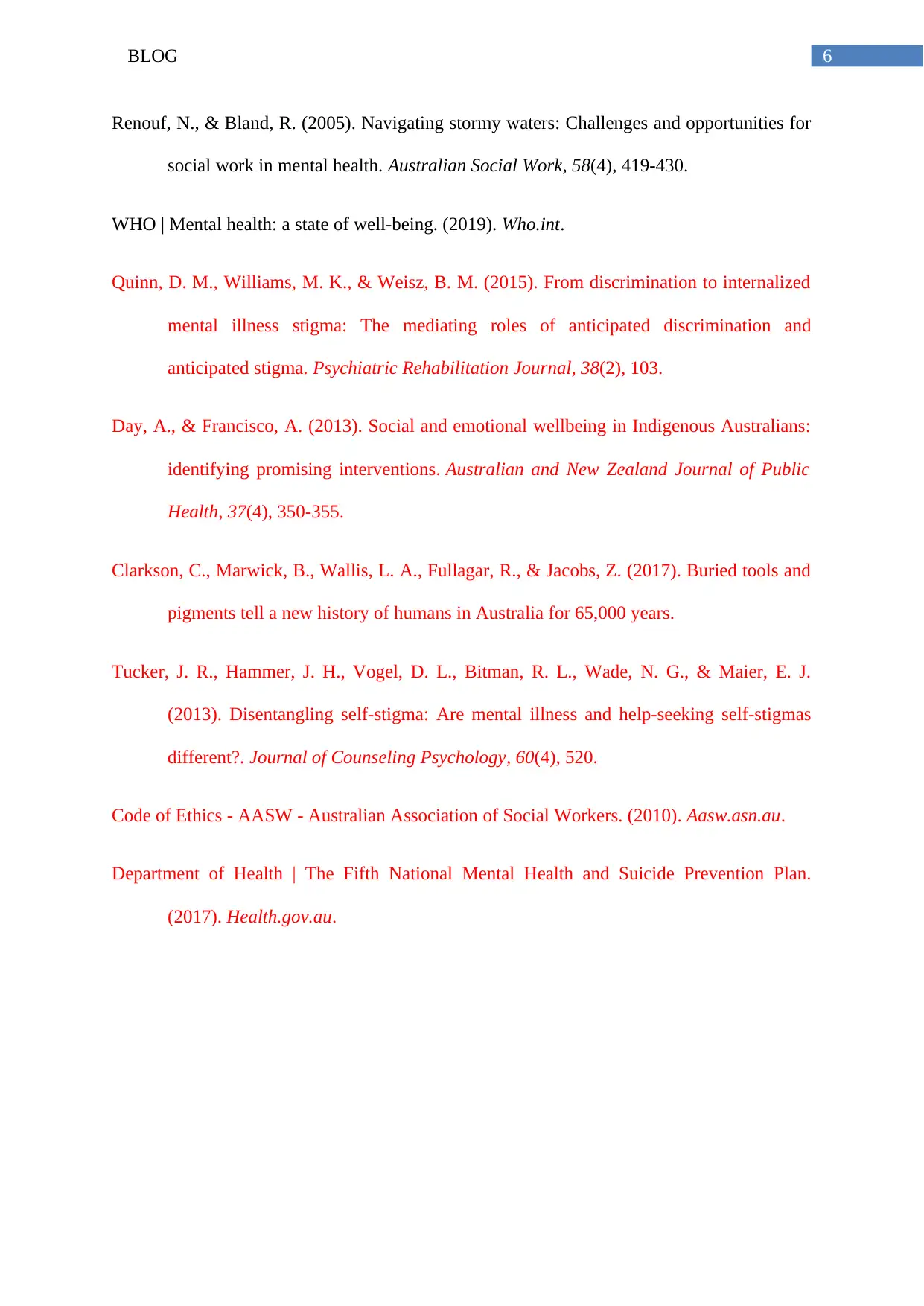
6BLOG
Renouf, N., & Bland, R. (2005). Navigating stormy waters: Challenges and opportunities for
social work in mental health. Australian Social Work, 58(4), 419-430.
WHO | Mental health: a state of well-being. (2019). Who.int.
Quinn, D. M., Williams, M. K., & Weisz, B. M. (2015). From discrimination to internalized
mental illness stigma: The mediating roles of anticipated discrimination and
anticipated stigma. Psychiatric Rehabilitation Journal, 38(2), 103.
Day, A., & Francisco, A. (2013). Social and emotional wellbeing in Indigenous Australians:
identifying promising interventions. Australian and New Zealand Journal of Public
Health, 37(4), 350-355.
Clarkson, C., Marwick, B., Wallis, L. A., Fullagar, R., & Jacobs, Z. (2017). Buried tools and
pigments tell a new history of humans in Australia for 65,000 years.
Tucker, J. R., Hammer, J. H., Vogel, D. L., Bitman, R. L., Wade, N. G., & Maier, E. J.
(2013). Disentangling self-stigma: Are mental illness and help-seeking self-stigmas
different?. Journal of Counseling Psychology, 60(4), 520.
Code of Ethics - AASW - Australian Association of Social Workers. (2010). Aasw.asn.au.
Department of Health | The Fifth National Mental Health and Suicide Prevention Plan.
(2017). Health.gov.au.
Renouf, N., & Bland, R. (2005). Navigating stormy waters: Challenges and opportunities for
social work in mental health. Australian Social Work, 58(4), 419-430.
WHO | Mental health: a state of well-being. (2019). Who.int.
Quinn, D. M., Williams, M. K., & Weisz, B. M. (2015). From discrimination to internalized
mental illness stigma: The mediating roles of anticipated discrimination and
anticipated stigma. Psychiatric Rehabilitation Journal, 38(2), 103.
Day, A., & Francisco, A. (2013). Social and emotional wellbeing in Indigenous Australians:
identifying promising interventions. Australian and New Zealand Journal of Public
Health, 37(4), 350-355.
Clarkson, C., Marwick, B., Wallis, L. A., Fullagar, R., & Jacobs, Z. (2017). Buried tools and
pigments tell a new history of humans in Australia for 65,000 years.
Tucker, J. R., Hammer, J. H., Vogel, D. L., Bitman, R. L., Wade, N. G., & Maier, E. J.
(2013). Disentangling self-stigma: Are mental illness and help-seeking self-stigmas
different?. Journal of Counseling Psychology, 60(4), 520.
Code of Ethics - AASW - Australian Association of Social Workers. (2010). Aasw.asn.au.
Department of Health | The Fifth National Mental Health and Suicide Prevention Plan.
(2017). Health.gov.au.
1 out of 7
Related Documents
Your All-in-One AI-Powered Toolkit for Academic Success.
+13062052269
info@desklib.com
Available 24*7 on WhatsApp / Email
![[object Object]](/_next/static/media/star-bottom.7253800d.svg)
Unlock your academic potential
Copyright © 2020–2026 A2Z Services. All Rights Reserved. Developed and managed by ZUCOL.




